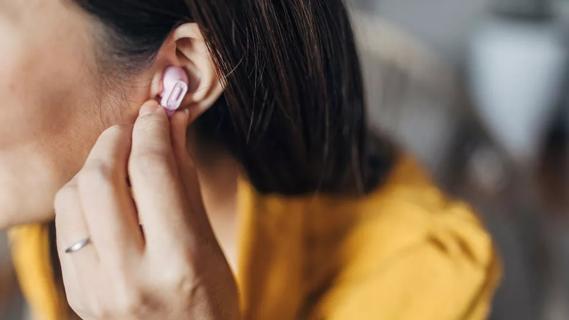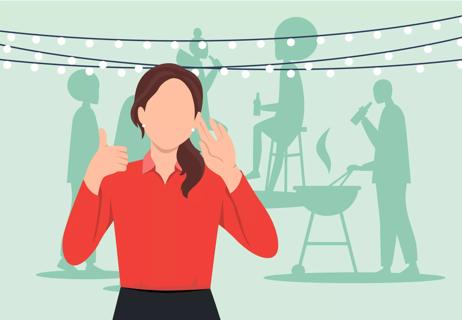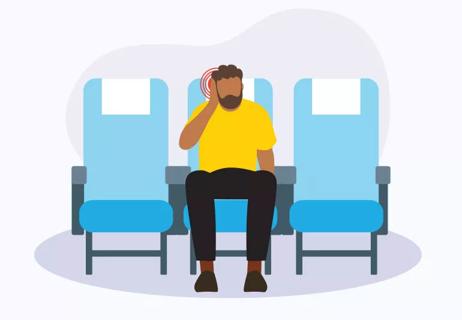Advertisement
An audiologist explains why you’re feeling overwhelmed and what to do about it

After more than a year spent primarily at home during the COVID-19 pandemic, there are a lot of things we’ve forgotten how to do, including socializing with other human beings and wearing pants with real waistbands. As you re-emerge from social isolation, though, you might also be surprised to discover that you’re overwhelmed by the sheer volume of the world around you.
Advertisement
Cleveland Clinic is a non-profit academic medical center. Advertising on our site helps support our mission. We do not endorse non-Cleveland Clinic products or services. Policy
Audiologist Sharon Sandridge, PhD, talks about hearing-related overstimulation following months of quarantine — and how to ease yourself back into the sounds of society without getting too overwhelmed.
It’s no secret that the pandemic has been incredibly stressful in a variety of ways. Even those who didn’t experience a traumatic COVID-19-related loss, such as the death of a loved one or the loss of a job, experienced the stress of an upended lifestyle that saw everyone struggling to adjust.
“We’re loosening up and going back to normal, but it’s not like there’s a light switch we can flick on to suddenly return to our pre-March 2020 lifestyle,” Dr. Sandridge says. “Being under the COVID-19 cloud for a year has increased our stress in all aspects, and when we have greater stress, we just can’t deal with life as easily.”
For many people, that translates into anxiety about going back out in public and interacting with other people again. That can be a jarringly noisy experience after so much time spent largely alone.
“When we go into a crowded environment now and feel overwhelmed, we may be reacting not necessarily to the noise but to the fact that there are so many people creating that noise,” Dr. Sandridge says. “We’re reacting to the experience of being in a crowd again.”
Advertisement
For many people, especially those who live alone or without small children, being quarantined was an inherently quiet experience — no noisy restaurants, no crowded bars, no bustling office — just the relative silence of home.
Dr. Sandridge says it’s likely that some people’s brains simply adjusted to the quiet and are now having trouble readjusting to the sounds of everyday life.
“Your brain is incredibly adept at multitasking. Pre-pandemic, your brain was actively engaged in separating conversation from background noise. That function may have ‘rested’ during the pandemic, as we had fewer opportunities to filter out the noise to hear someone talk,” Dr. Sandridge says. “Now, we need to re-engage or re-active that part of the brain to allow us to understand conversations in a crowded environment.”
That means that when you finally step into a restaurant, you may be particularly overwhelmed by the perceived volume of the world around you — including music, conversations and other background noises — that initially make it more difficult for you to concentrate or to interact normally.
Symptoms of auditory overstimulation may include:
Even though it may feel like life has returned to “normal,” Dr. Sandridge points out that we’ve all been living in a state of heightened stress since the pandemic began. Although our stress may have abated, it has not gone away.
“You can’t live with that kind of stress for 18 months without it having an impact,” she says. “We’re less tolerant of stressors, and we get irritable more easily. Our threshold levels have changed.”
That includes our threshold for sounds. Though there are no formal studies yet on this topic, Dr. Sandridge says audiologists have observed a change in professional musicians’ volume tolerance during the pandemic, indicating a “reset” during the pandemic.
In other words? Noises don’t need to be as loud as they used to be to seem loud now.
There’s also the mask factor. We’ve all become accustomed to speaking up to be heard behind the veil, which may contribute to louder vocal volumes than usual — especially now that many people are going unmasked.
“We’re so used to raising the intensity of our voices because of masks,” Dr. Sandridge. “Now we need to learn to lower it because we don’t have that extra fabric muffling sounds and obscuring visuals.”
If you find yourself sensitive to sound while in a loud space — or a space that feels louder than you’re used to — these techniques can help you manage in the moment.
Advertisement
There’s not much you can do to prepare your brain to encounter noisiness again. But you can, at least, ease into it. Placing yourself in lower-volume scenarios to start will help your brain readjust on a graduated basis.
“Take it gradually,” Dr. Sandridge advises. “Don’t step into a 1,000-person rock concert right off the bat.”
If you’re in a particularly loud place, it can be helpful to briefly retreat outside or even to the restroom — anywhere slightly quieter where you can collect your thoughts and start anew.
“That will let you get a hold of yourself and calm yourself down,” Dr. Sandridge says.
Bring noise-canceling headphones with you when you know you’re likely to be in louder-than-usual places, such as on a bus or airplane. This can help drown out the noise around you and allow you to focus in on one stream of sound. Even better? Pipe in some soothing sounds on a meditation app or podcast to get you through.
Deep breathing techniques can help ground you and combat the feeling of being overwhelmed. Try 4×4 breathing, also known as box breathing:
Advertisement
“Be in the moment, concentrate on your breathing, take deep breaths, and ignore everything else,” Dr. Sandridge says. “Just increase that breathing, which will help you de-stress.”
Just as your brain quickly adapted to a quieter quarantine life, so too will it come (back) around on being used to noisiness.
“The brain is so plastic that as soon as we start putting ourselves in louder situations, we will retrain our brain to not pay attention to the background noise,” Dr. Sandridge says. “The levels will seem tolerable.”
In other words, you might feel overwhelmed the first few times you step out in public or into very loud scenarios — but soon, the background noise will go back to being in the background.
Advertisement
Learn more about our editorial process.
Advertisement

Hearing aids can be enough for some people, but other devices — like for your phone, TV and fire alarm — can help, too

Untreated hearing loss can affect kids’ speech and language development and their overall quality of life

Turning your head to the side and pulling your ear up and back is one common tactic for relief

Avoid poorly fitting gear, opt for quality devices and consider sound-limiting technology to help prevent noise-induced hearing loss

Reduce background noise, don’t talk too fast or too slow and above all, ask what’s most helpful to them

Care for your ears by steering clear of cotton swabs, taking precautions in loud settings and seeking medical help when needed

There are lots of tips, tricks and assistive devices out there that can help

There are a few safe ways to relieve this uncomfortable pressure

If you’re feeling short of breath, sleep can be tough — propping yourself up or sleeping on your side may help

If you fear the unknown or find yourself needing reassurance often, you may identify with this attachment style

If you’re looking to boost your gut health, it’s better to get fiber from whole foods